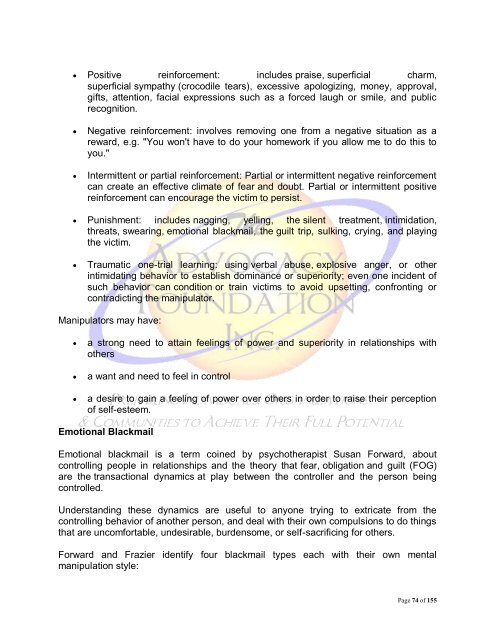Organizational Dysfunction
Organizational Dysfunction
Organizational Dysfunction
You also want an ePaper? Increase the reach of your titles
YUMPU automatically turns print PDFs into web optimized ePapers that Google loves.
Positive reinforcement: includes praise, superficial charm,<br />
superficial sympathy (crocodile tears), excessive apologizing, money, approval,<br />
gifts, attention, facial expressions such as a forced laugh or smile, and public<br />
recognition.<br />
<br />
<br />
Negative reinforcement: involves removing one from a negative situation as a<br />
reward, e.g. "You won't have to do your homework if you allow me to do this to<br />
you."<br />
Intermittent or partial reinforcement: Partial or intermittent negative reinforcement<br />
can create an effective climate of fear and doubt. Partial or intermittent positive<br />
reinforcement can encourage the victim to persist.<br />
Punishment: includes nagging, yelling, the silent treatment, intimidation,<br />
threats, swearing, emotional blackmail, the guilt trip, sulking, crying, and playing<br />
the victim.<br />
<br />
Traumatic one-trial learning: using verbal abuse, explosive anger, or other<br />
intimidating behavior to establish dominance or superiority; even one incident of<br />
such behavior can condition or train victims to avoid upsetting, confronting or<br />
contradicting the manipulator.<br />
Manipulators may have:<br />
<br />
<br />
<br />
a strong need to attain feelings of power and superiority in relationships with<br />
others<br />
a want and need to feel in control<br />
a desire to gain a feeling of power over others in order to raise their perception<br />
of self-esteem.<br />
Emotional Blackmail<br />
Emotional blackmail is a term coined by psychotherapist Susan Forward, about<br />
controlling people in relationships and the theory that fear, obligation and guilt (FOG)<br />
are the transactional dynamics at play between the controller and the person being<br />
controlled.<br />
Understanding these dynamics are useful to anyone trying to extricate from the<br />
controlling behavior of another person, and deal with their own compulsions to do things<br />
that are uncomfortable, undesirable, burdensome, or self-sacrificing for others.<br />
Forward and Frazier identify four blackmail types each with their own mental<br />
manipulation style:<br />
Page 74 of 155

















